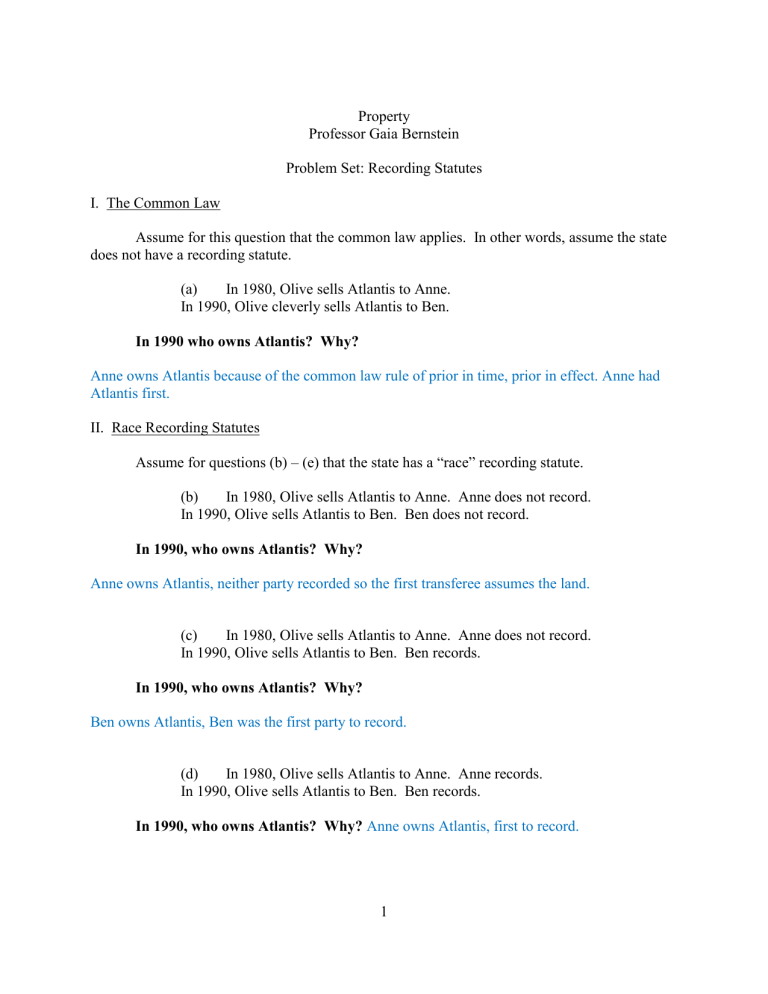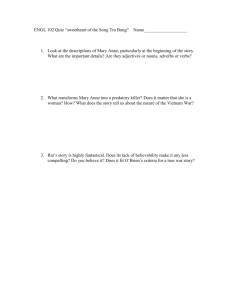
Property Professor Gaia Bernstein Problem Set: Recording Statutes I. The Common Law Assume for this question that the common law applies. In other words, assume the state does not have a recording statute. (a) In 1980, Olive sells Atlantis to Anne. In 1990, Olive cleverly sells Atlantis to Ben. In 1990 who owns Atlantis? Why? Anne owns Atlantis because of the common law rule of prior in time, prior in effect. Anne had Atlantis first. II. Race Recording Statutes Assume for questions (b) – (e) that the state has a “race” recording statute. (b) In 1980, Olive sells Atlantis to Anne. Anne does not record. In 1990, Olive sells Atlantis to Ben. Ben does not record. In 1990, who owns Atlantis? Why? Anne owns Atlantis, neither party recorded so the first transferee assumes the land. (c) In 1980, Olive sells Atlantis to Anne. Anne does not record. In 1990, Olive sells Atlantis to Ben. Ben records. In 1990, who owns Atlantis? Why? Ben owns Atlantis, Ben was the first party to record. (d) In 1980, Olive sells Atlantis to Anne. Anne records. In 1990, Olive sells Atlantis to Ben. Ben records. In 1990, who owns Atlantis? Why? Anne owns Atlantis, first to record. 1 (e) In 1980, Olive sells Atlantis to Anne. Anne does not record. In 1990, Olive sells Atlantis to Ben. Ben knows about Anne’s prior purchase. Ben records. In 1990, who owns Atlantis? Why? Ben owns Atlantis, for the race statute it does not matter if the subsequent purchaser has actual knowledge of the prior purchaser’s claim, all that matters is who recorded first. III. Notice Recording Statutes Assume for questions (f) – (i) that the state has a “notice” recording statute. (f) In 1980, Olive sells Atlantis to Anne. Anne does not record. In 1990, Olive sells Atlantis to Ben. Ben knows about Anne’s prior purchase. Ben records. In 1990, who owns Atlantis? Why? How does this compare with your answer to (e)? Anne owns Atlantis because B knew about Anne’s prior purchase making the notice recording statute invalid. For the race statute it doesn’t matter if there was knowledge about prior recording claim, but it matters for the notice statute. (g) In 1980, Olive sells Atlantis to Anne. Anne does not record. In 1990, Olive sells Atlantis to Ben. Ben does NOT know about Anne’s prior purchase. Ben records. In 1990, who owns Atlantis? Why? Ben owns Atlantis because Ben recorded first and did not have knowledge of Anne’s prior purchase. (h) In 1980, Olive sells Atlantis to Anne. Anne does not record. 2 In 1990, Olive sells Atlantis to Ben. Ben does NOT know about Anne’s prior purchase. Ben does not record. In 1990, who owns Atlantis? Why? How does this compare with the approach under the common law? Anne wins because neither party recorded, and Anne was first in time. (i) In 1980, Olive sells Atlantis to Anne. Anne records. In 1990, Olive sells Atlantis to Ben. Ben records. In 1990, who owns Atlantis? Why? Anne owns Atlantis because Anne recorded before B. IV. Race-Notice Recording Statutes Assume for questions (j) – () that the state has a “race-notice” recording statute. (j) In 1980, Olive sells Atlantis to Anne. Anne does not record. In 1990, Olive sells Atlantis to Ben. Ben does NOT know about Anne’s prior purchase. Ben does not record. In 1990, who owns Atlantis? Why? How does your answer to this question compare with your answer to (h)? Anne wins because neither party recorded, and Anne was first in time. Same answer as H. (k) In 1980, Olive sells Atlantis to Anne. Anne does not record. In 1990, Olive sells Atlantis to Ben. Ben does NOT know about Anne’s prior purchase. Ben records. In 1990, who owns Atlantis? Why? Ben owns Atlantis, because Anne did not record, Ben did not know about the prior purchase and B recorded first after the sale to B. 3 (l) In 1980, Olive sells Atlantis to Anne. Anne does not record. In 1990, Olive sells Atlantis to Ben. Ben knows about Anne’s prior purchase. Ben records. In 1990, who owns Atlantis? Why? Anne owns Atlantis because Ben knew about the prior sale to Anne. V. Multiple Transactions! Given the following transactions and recordings, explain who has title in (1) a “notice” jurisdiction, and (2) a “race-notice” jurisdiction. Why? O conveys to A, who does not record. O conveys to B, who knows of the deed from O to A and does not record. O conveys to C, who does not record. B conveys to D, who does not record; D has seen the deed from O to B. A records. B records. D records. 4




